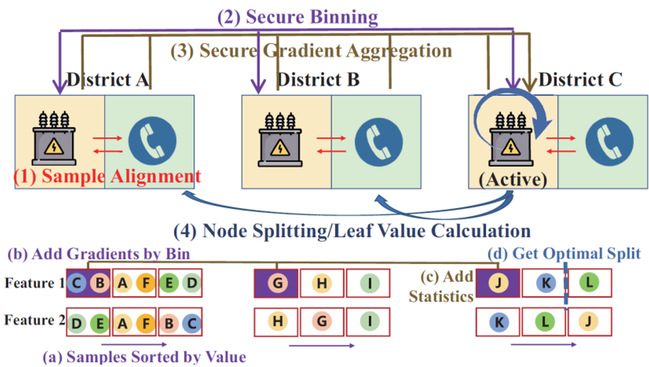With the depletion of worldwide energy resources, many countries are actively exploring pathways to efficient energy utilization. The concept of smart cities has therefore received great attention from both academia and industry. Smart cities aim to collect heterogeneous energy-related datasets from different districts, meanwhile exploring their potential values and endogenous relationships, in order to provide insights for the planning, construction, and operation of the city. However, when multi-district models need to be constructed for the smart cities (e.g., multi-district load forecasting), districts usually upload all data directly to the central coordinator for centralized learning, which compromises the data privacy of each energy-related entity and leads to high communicational/computational burdens.

Fig. 1 An overview of smart cities
Prof. Xuan ZHANG and Prof. Xinwei SHEN’s research group from Tsinghua SIGS has proposed two district collaborative learning frameworks based on federated learning and applied them in the field of district load forecasting of smart cities, which could effectively resolve the above issues. Based on the observation that both homogeneous and heterogeneous energy-related entities coexist within smart cities, they developed a hybrid federated learning framework that seamlessly combined horizontal and vertical federated learning. The framework breaks the information barriers of data in both the sample dimension and feature dimension to achieve efficient, distributed, and privacy-preserving collaborative load forecasting. Further, based on the observation that energy entities in different regions have different energy consumption characteristics, the research group has further proposed a federated multi-task learning framework, which seamlessly integrates multi-task learning into federated learning with gradient-boosted regression trees, such that both commonalities and differences in the district load consumption patterns can be fully learned. The above frameworks can meet the privacy preservation requirements for all energy-related entities, including but not limited to the power grid and mobile companies.

Fig. 2 Hybrid federated learning can break the information barriers between different energy entities

Fig. 3 Training process of the hybrid federated learning framework

Fig. 4 Federated multi-task learning based on gradient-boosted regression trees

Fig. 5 Training process of the federated multi-task learning framework
This research was published in two papers entitled “A Hybrid Federated Learning Framework with Dynamic Task Allocation for Multi-Party Distributed Load Prediction” and “Boosted Multi-Task Learning for Inter-District Collaborative Load Forecasting” in IEEE Transactions on Smart Grid. The proposed frameworks were also implemented in the Smart City Project of the Zhuhai Power Supply Bureau, becoming the first power grid project that implements federated learning.
Haizhou LIU, a Ph.D. candidate at Tsinghua SIGS, is the first author of the papers. Assistant Professors Xuan ZHANG and Xinwei SHEN from Tsinghua SIGS are the corresponding authors. Co-authors of the papers also include Prof. Hongbin SUN from Tsinghua University and Prof. Mohammad SHAHIDEHPOUR from the Illinois Institute of Technology. The research is funded by the National Natural Science Foundation of China; the Science, Technology and Innovation Commission of Shenzhen Municipality; and the Zhuhai Power Supply Bureau of the Southern Power Grid. The project was also guided by insights from Prof. Qiang YANG and Dr. Yan KANG from WeBank.
Links to full articles:
https://doi.org/10.1109/TSG.2022.3215742
https://doi.org/10.1109/TSG.2023.3266342
Written by Liu Haizhou
Edited by Alena Shish & Yuan Yang


